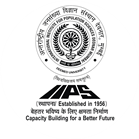- About IIPS
- Academics
- Study @ IIPS
- Departments
- Centres
- Controller of Examination
- Programme
- Distance and Online Education
- Training
- Facilities/Services
- Resources
- Virtual Learning
- Digital Initiatives (MHRD)
- Notice
- Seminars / Workshops / Conferences
- Conferences
- Publications
- Seminars
- Sponsored Research
- Workshops
- Collaboration
- National
- International
- NEP 2020
- Admission
- Courses
- Admission Bulletin
- TIME-TABLE For Admission 2025-26
- Model Question Papers
- Programme Coordinators
- Fellowships
- Academic Calendar
- International Students
- Visa Information
- Administration
- Faculty & Staff
- Research & Publications
- Library
- Information
- Right to Information
- Vigilance Officer
- Annual Report
- Director's Report
- Cells & Commitees
- Cells
- Commitees
- Committees of NEP 2020
- Staff Walfare Committee
- Cultural Committee
- Internal Committee
- Purchase Commitee
- Students Academic Committee
- Student Research Ethics Committee
- Anti-Ragging Committee
- Institutional Review Board
- Social Media Committee
- Prevention of Caste-based Discrimination Committee
- Code of Conduct and Professional Ethics
- National and International honours, Awards, Recognition, and Medals
- Online Facilities
- Employee's Corner
- Memorial Lectures
- Convocation
- IIPS Newsletters
- COVID 19 Information
- Life @ IIPS
Progress and Equity in informed choice methods received by women in Uttar Pradesh and its districts
- Home
- Progress and Equity in informed choice methods received by women in Uttar Pradesh and its districts
Abstract Content (not more than 300 word, should include: Introduction, Objective, Methodology, critical findings & Conclusion):
Introduction: The information shared during a contraceptive visit is crucial because it helps clinicians understand the clients' goals regarding reproduction and ensures that clients are adequately informed about available techniques, potential side effects, and issues linked to them. Objective: This study aims to analyze the progress and equity in informed choice methods received by women in Uttar Pradesh and its districts. Methodology: The fourth and fifth rounds of National Family Health Survey data with sample sizes 97,661 and 93124, respectively, from Uttar Pradesh, were used to calculate the Method Information Index (MII), a Family Planning 2020 indicator that reflects some aspects of contraceptive information exchanged between providers and clients. For each district, the MII was calculated from two surveys about five years apart to examine change in the indicator over time. Afterward, univariate, bivariate, and difference methods were used for the analysis. Critical Findings & Conclusions: The results show substantial progress in contraception-related information exchange: side effects increased from 47% to about 70%, what to do when experienced side effects rose from 36% to 58%, information of other methods to use grew by 23 percentage points, and the comprehensive MII surged by 23 percentage points. Results show a notable 32-point increase in information for pill users, exceeding gains for IUD (12 points) and female sterilization (20 points). Women obtaining contraceptives informally exhibit a higher MII at 62%. Younger women (15-19) saw a substantial increase to 67%, a rise of over 50 points. Balrampur, Hamirpur, Sultanpur, and Siddharthnagar experienced significant MII increases, while Allahabad (Prayagraj), Moradabad, and Firozabad witnessed significant decreases. Many districts have room to increase provider-client information exchange based on the MII. Programs and donors would need to work together to make such improvements.
Abstract theme:
In case of not been selected for oral presentation, do you want to be considered for the poster presentation ?:
Yes
Do you require financial support to attend the seminar ? (Not applicable for virtual meet):
Yes-full
Gender:
Male
Evaluation Status:
No
